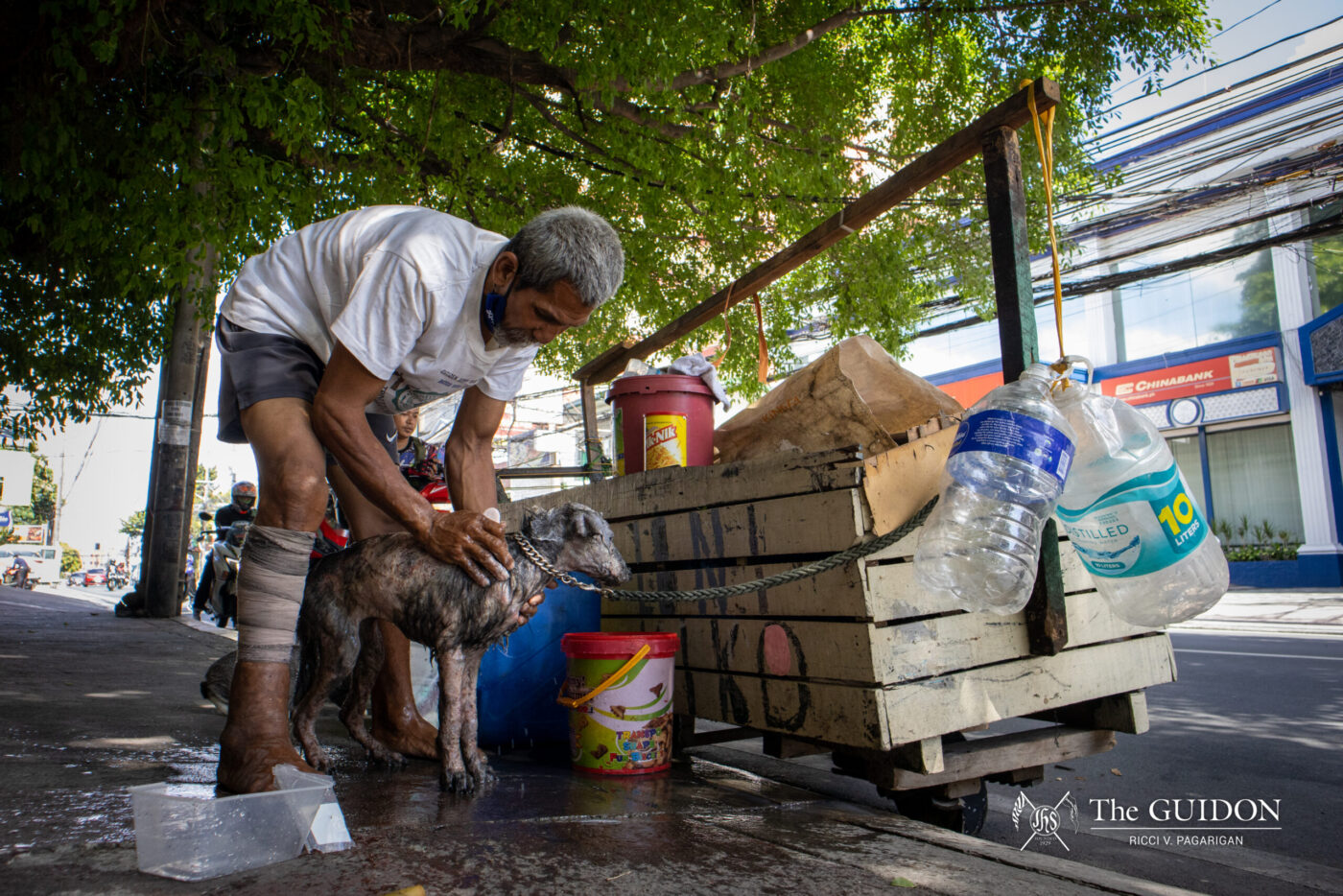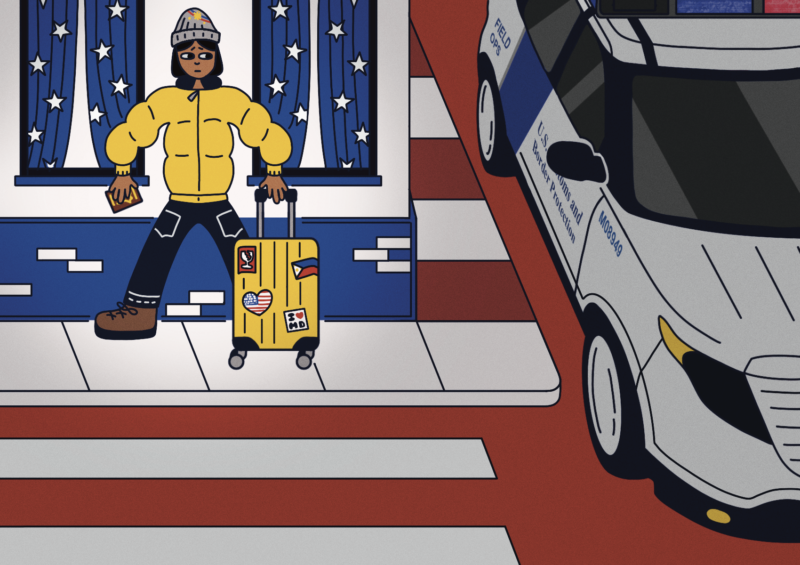Dek: Often disregarded and ignored, kariton street dwellers face layers of social exclusion on top of their daily struggles for survival.
KUYA BOYET is a street-dweller. His home is a wooden kariton with unsturdy wheels and a faded “Leni-Kiko” illustration painted on its right side.
Kuya Boyet exists in solitude—seemingly distrustful but actually kind to most people. The only family he lovingly and willingly discusses are his pets: eight cats named Ovaltine, Putot, Negra, Orange, One, Two, Three, and Four; and two dogs named Chuchu and Baboy.
For many homeless Filipinos, their kariton is the only space and structure they can occupy and own. Lingering around upscale buildings and busy streets, city dwellers remain mostly unnoticed, reliant on scraps and spared kindness.
Down memory lane
Kuya Boyet does not fully share his life before the streets, aside from expressing his desire to ride a motorcycle again. Unlike with his pets, he only discloses bits and pieces of an amorphous past.
Although his family is from Pampanga, he has always lived in Manila. While his parents have passed away, his siblings are alive. However, he has no means of contacting them and doubts that they would help him. He was once close to one of his older brothers, but they have not spoken in years for unknown reasons.
He was married to Ate Leta, whom he met 20 years ago when he was already on the streets. He describes her vaguely, listing only minute details: from Manila, father from Bicol, mother from Davao, and 52 years old.
He shares no stories about her, except for one. “[M]ahirap alagaan ‘yung partner ko. Talo pa mga alaga ko—mga alaga ko, ‘pag iniwan ko, [sasabihin ko,] ‘diyan lang kayo.’ Pagbalik ko nandyan pa rin sila. ‘Yung partner ko, kung sinabi ko ‘diyan ka lang,’ nakabuntot kaagad,” he shares in jest.
(My partner is hard to look after. My pets are even better: I say ‘stay there.’ When I get back they’re still there. My partner follows me even when I tell her to stay.)
Kuya Boyet’s hesitance to explain his history highlights a general distrust with regards to opening up about the past. Ved*, a volunteer from Karition Coalition, shares that most street dwellers also carry Kuya Boyet’s reluctance. “If you ask [a street dweller] why they ended up as such, they won’t tell you the real truth,” he explains in a mix of Filipino and English. He further emphasizes that gaining their trust takes time.
Pastor Tim Ngo, the founder of Kariton Coalition, also says that the current situation of kariton dwellers may be the only reality they now know best. As such, Kuya Boyet is unflinching when describing his life on the streets.
Curb bonfires and cement bed naps
Every morning, Kuya Boyet’s wobbly kariton enters Xavierville—his favorite place on his Quezon City route. Here, the owners of a local car wash let him shower using their facilities, even giving him tap water to bathe his cats and dogs. Meanwhile, a small mineral water station supplies him some drinks. After a long day, Kuya Boyet chooses to travel to Project 2, another barangay in the city, to get a safer night’s rest.
This precaution stems from his fear of other street dwellers. “Nangangalakal na nga lang ako, ninanakawan pa ako (All I do is gather scraps, yet I still get stolen from),” he shares. Kuya Boyet continuously condemns street dwellers who steal from people living in push carts and those with houses.
Nonetheless, Ngo emphasizes that not all street dwellers steal. “For one street dweller that engages in criminal activity, around 200 innocent homeless people are unfairly perceived,” he shares in a mix of Filipino and English.
Part of this 200, Kuya Boyet simply gathers materials off the streets for selling. In his daily roundabout journey around Quezon City, he picks up scraps, avoiding certain areas in fear of confiscation. He makes an average of Php 100 daily, but at times only scrapes up Php 75.
As prices of food in the country rise due to inflation, Kuya Boyet lives off of a forced diet for as long as his family is taken care of. “Kahit hindi ako makakain, basta iyong mga alaga ko [makakain]… Kumakain din [iyong asawa ko]. Nauuna pa nga siya,” he shares.
(Even if I do not get to eat, as long as my pets get to eat… My wife also gets to eat. She even eats first.)
Fast paces and averted gazes
Navigating struggles on the streets everyday, Kuya Boyet’s days are marked with onlookers—some who extend a helping hand and others who just walk by. According to Ngo, street dwellers continue to battle social stigma, leading to a harmful generalization of them as lazy and dangerous. Ngo shares that the government’s view of “street obstructions” has unjustly evolved to include the homeless and their meager properties.
Kuya Boyet’s kariton has been taken multiple times by Metropolitan Manila Development Authority officers and barangay officials. “Kinuha [dati ng barangay] iyong kariton ko… Binalik nila, wala na iyong mga alaga ko,” he says about one of many instances.
(The barangay got my pushcart before… They returned it, but my pets were gone.)
However, Kuya Boyet received aid from local government units after his wife’s death just last March 21. From a barangay captain paying for hospital bills to local mayors organizing the burial, Kuya Boyet shared his gratitude for the outpouring of help amid battling grief.
Despite this, he mentioned no instance of receiving any kind of formal assistance. The Modified Conditional Cash Transfer for Homeless Street Families was introduced because the Pantawid Pamilyang Pilipino Program excludes individuals without a permanent residence. However, the process of assigning recipients remains selective.
Common folk have thus carried the task of helping those like Kuya Boyet. Once, a student named Melody started talking with Kuya Boyet, prompting her to regularly help by giving him money and food. “Sumasabay lang siya sa amin maglakad, hanggang sa [tinulungan] na niya kami (She used to walk with us until she eventually helped us), he says.
Even with people’s varying treatment of him, Kuya Boyet possesses a rare selflessness which shines through his efforts for his family of pets. He even takes it upon himself to adopt neglected street animals. “May ibang tao diyan na nakikita mga alaga ko, akala nila napapabayaan pero mahigit pa nga sa tao na inaalagaan ‘yan (There are those who see my pets and think they are neglected, but they receive more care than a person would),” he shares.
Despite the alienation that Kuya Boyet continues to face, his life of caring for his pets is one of empathy and care. Kuya Boyet’s narrative proves that street dwellers should never be defined by the harmful stigma that further pushes them to the margins.
*Editor’s Note: The interviewee’s name has been changed at their request to protect their identity and privacy.







